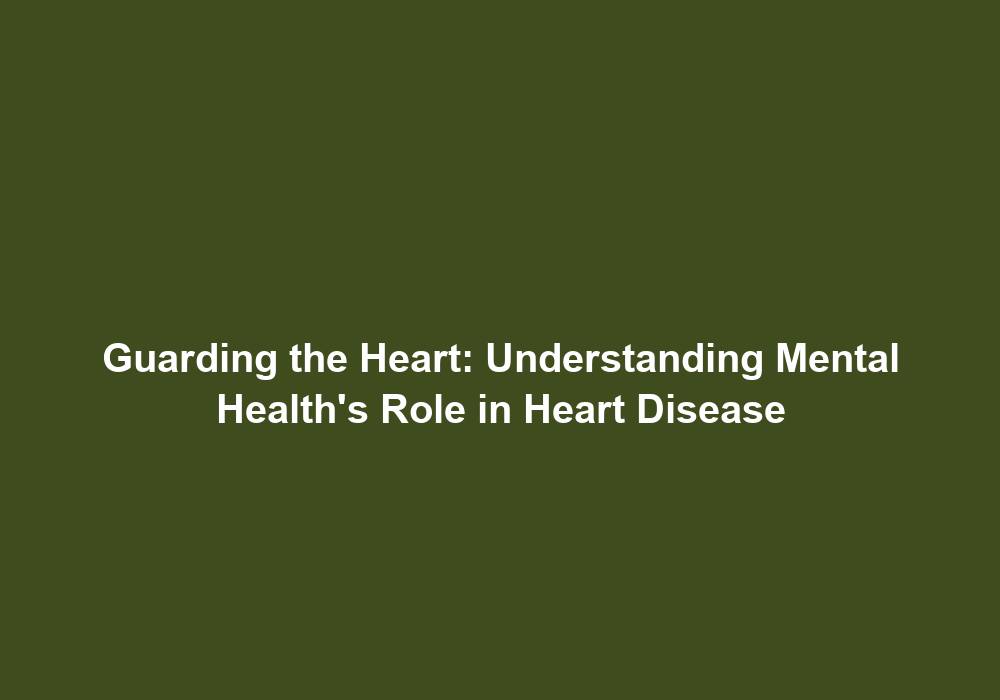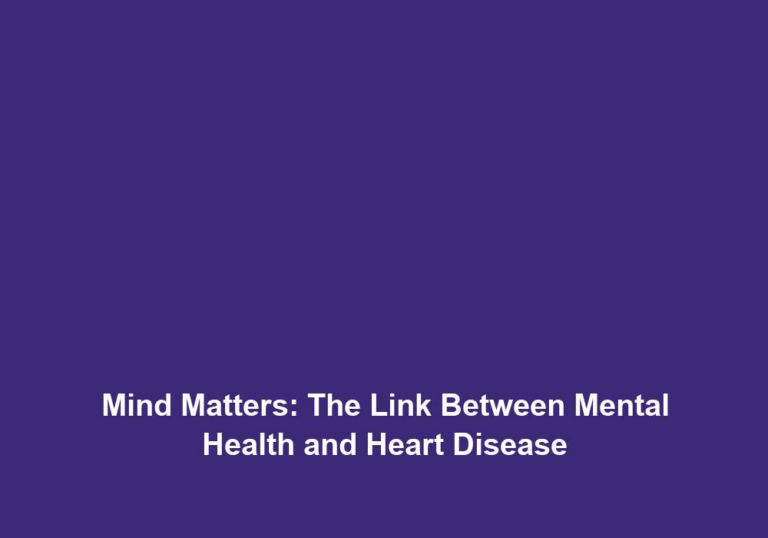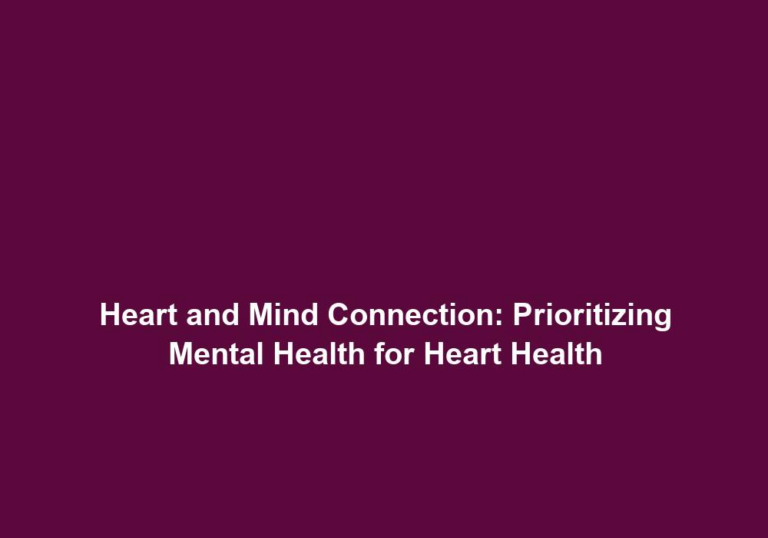Guarding the Heart: Understanding Mental Health’s Role in Heart Disease
Heart disease is a major concern worldwide, causing significant morbidity and mortality. While traditional risk factors such as high blood pressure, high cholesterol, smoking, and obesity play a crucial role in the development of heart disease, recent research has shown that mental health also has a significant impact on cardiovascular health.
The Mind-Heart Connection
Our mental and emotional well-being can greatly influence our physical health, including the health of our heart. Increasing evidence suggests that certain mental health conditions, such as depression, anxiety, and chronic stress, can contribute to the development and progression of heart disease.
Depression and Heart Disease
Depression is more than just feeling sad or blue; it is a serious mental health condition that affects millions of people worldwide. Studies have consistently shown that individuals with depression are at a higher risk of developing heart disease compared to those without depression.
Depression can lead to various physiological changes in the body, such as increased inflammation, oxidative stress, and an unhealthy lifestyle characterized by poor diet, lack of exercise, and substance abuse. These factors can directly contribute to the development and progression of heart disease.
Furthermore, depression often coexists with other risk factors such as obesity, smoking, and diabetes, which further amplify the risk of heart disease. Effective management of depression through therapy, medication, and lifestyle modifications can reduce the risk of heart disease in individuals with depression.
Anxiety and Heart Disease
Anxiety disorders, including generalized anxiety disorder, panic disorder, and post-traumatic stress disorder (PTSD), can also impact heart health. Chronic anxiety is associated with elevated levels of stress hormones, which can increase blood pressure, heart rate, and inflammation, thereby raising the risk of heart disease.
Moreover, individuals with anxiety may engage in unhealthy coping mechanisms such as smoking, overeating, or avoiding physical activity, all of which can contribute to the development of heart disease. Treating anxiety through therapy, medication, and stress management techniques can help reduce cardiovascular risk in these individuals.
Chronic Stress and Heart Disease
In today’s fast-paced world, chronic stress has become a common experience for many. Prolonged exposure to stressful situations can have detrimental effects on cardiovascular health. Chronic stress activates the body’s stress response, leading to increased production of stress hormones like cortisol and adrenaline.
Elevated levels of stress hormones can raise blood pressure, increase heart rate, and promote inflammation, all of which contribute to the development and progression of heart disease. Chronic stress can also lead to unhealthy behaviors such as overeating, smoking, and excessive alcohol consumption, further exacerbating the risk of heart disease.
Effective stress management techniques, such as exercise, mindfulness meditation, and relaxation exercises, can help mitigate the negative impact of chronic stress on heart health. Engaging in regular physical activity helps reduce stress levels, lowers blood pressure, and improves overall cardiovascular health. Mindfulness meditation and relaxation exercises promote relaxation, reduce anxiety, and improve emotional well-being.
Strategies for Maintaining Good Mental and Heart Health
It is evident that mental health plays a crucial role in heart disease. To safeguard both our mental and heart health, adopting the following strategies can be beneficial:
1. Seek Professional Help
If you are experiencing symptoms of depression, anxiety, or chronic stress, it is essential to seek professional help. Mental health professionals can provide appropriate diagnosis, treatment, and support to help you manage your mental well-being effectively. They can offer therapy sessions, prescribe medications if necessary, and guide you through lifestyle modifications that can improve your mental and cardiovascular health.
2. Practice Healthy Lifestyle Habits
Engaging in a healthy lifestyle is paramount for maintaining good mental and heart health. Regular physical exercise not only helps in managing stress but also improves mood, promotes better sleep, and reduces the risk of heart disease. Aim for at least 150 minutes of moderate-intensity aerobic activity or 75 minutes of vigorous-intensity aerobic activity per week. Additionally, a balanced diet rich in fruits, vegetables, whole grains, lean proteins, and healthy fats supports both mental and cardiovascular health. Avoiding excessive alcohol consumption and quitting smoking are also crucial steps towards heart health.
3. Manage Stress Effectively
Stress is an unavoidable aspect of life, but learning to manage it effectively can protect your heart health. Engage in stress-reducing activities, such as yoga, meditation, deep breathing exercises, and engaging in hobbies that bring you joy. These activities help activate the body’s relaxation response, reducing stress hormones and promoting a sense of calm. Taking breaks, setting boundaries, and practicing self-care are also vital in managing stress. Prioritize self-care activities that make you happy and relaxed, such as taking baths, reading books, or spending quality time with loved ones.
4. Build Social Connections
Maintaining strong social connections and nurturing relationships can have a positive impact on mental and heart health. Engage in activities that promote social interaction, join clubs or groups with similar interests, and seek support from loved ones during challenging times. Social support provides a sense of belonging, reduces feelings of isolation, and helps in managing stress and emotional well-being. Make an effort to connect with friends, family, and community members regularly, both online and offline.
5. Be Mindful of Your Mental Health
Regularly check in with yourself and pay attention to your mental and emotional well-being. If you notice any signs of distress, don’t hesitate to seek help. Prioritizing self-care, practicing self-compassion, and fostering a positive mindset can go a long way in safeguarding your mental health and, consequently, your heart health. Engage in activities that promote mental well-being, such as practicing gratitude, journaling, or engaging in hobbies that bring you joy. Take time to relax and recharge, and be gentle with yourself during challenging times.
In conclusion, understanding the connection between mental health and heart disease is vital for comprehensive cardiovascular care. By addressing mental health conditions such as depression, anxiety, and chronic stress, and adopting strategies for maintaining good mental and heart health, we can better protect ourselves against the devastating impact of heart disease. Remember, a healthy mind leads to a healthy heart.







